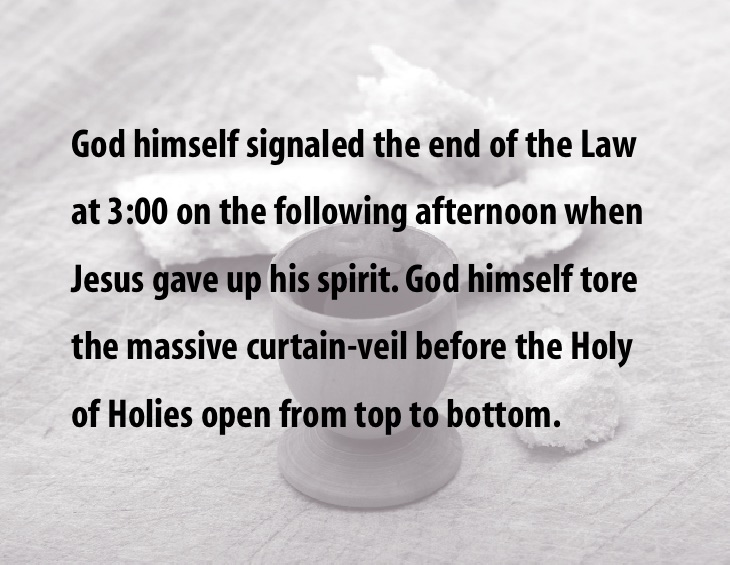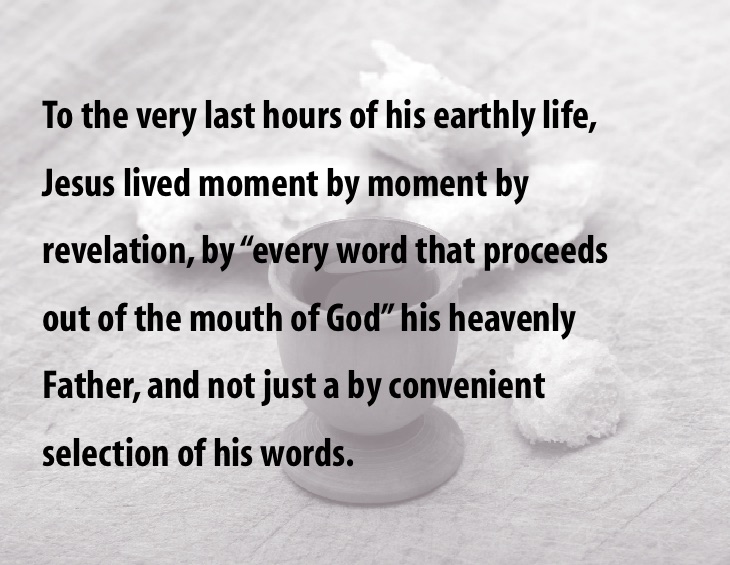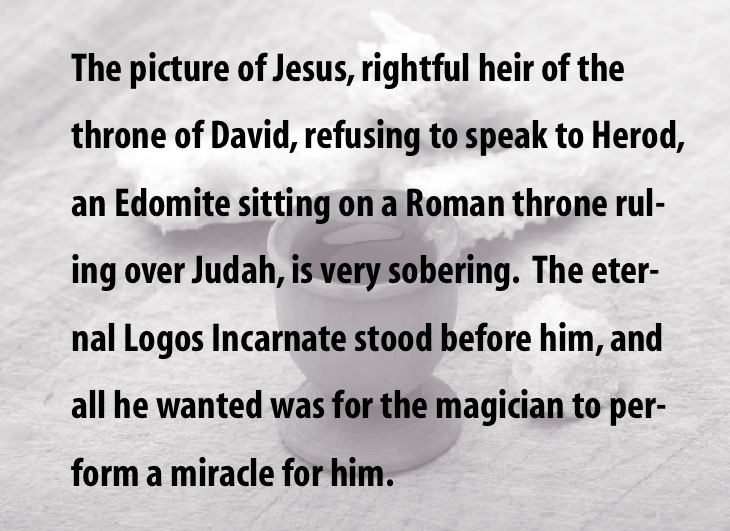R. K. MCGREGOR WRIGHT
Preamble
All four Gospels record the last few days of Christ’s life in unusual detail because his death and resurrection were the primary reasons he came to earth. All four Gospels make the account of the “Passion Week” much fuller than any other period in Jesus’ life and record important details about it, including the events of the Thursday before the Friday on which he was crucified. We will concentrate here on the significance of Jesus’ last Passover meal which He celebrated on Thursday (and which we celebrate today as the “Lord’s Supper” [1 Cor 11:23-34]), and will also consider some implications of the “trial” of Christ.
The Passover Meal
The family celebration of Passover could be kept at any time during the week of Passover, but most people met for this feast on the evening of the day before the “Sabbath preparation” (or Friday) when the Passover lambs were ritually slain. After a day of teaching in the Temple area, Jesus greatly wished to have this last meal with the disciples as His earthly family. God provided for them to celebrate Passover in the home of an unknown disciple with “an upper room” (Lk 22:7-16). It is important to remember that even this late in Jesus’ ministry, the disciples had not made any conscious connection between the Baptist’s “Lamb of God” and the impending death of Christ, which they certainly should have realized could happen. In fact, they were in the same zone of denial that the whole of first century Judaism was in—denial about the Old Testament predictions of a dying Messiah. There is a real sense that Jesus, as the ideal Elect One of Israel, stands at this time before God representing the whole people of Israel. Now, after fulfilling the work of the nation prescribed in the Torah which was so signally unfulfilled by the Jews, Jesus was about to return to the Father. He was about to perform the last earthly steps of obedience to the Law by offering Himself as “the Just for the unjust, to bring us to God” (1 Pet 3:18). The people of the Old Covenant had been unable to offer such a sacrifice for themselves.
All areas of Christianity recognize that this final Passover meal looked back to the Jews’ leaving Egypt and forward to events to follow the Second Coming. “I will not drink of this fruit of the vine from now on until that day when I drink it new with you in my Father’s Kingdom,” promises the Lord as He inaugurates the New Covenant “in [His] blood” (Lk 22:18, 20). Paul understood these promises of Jesus to refer to the Second Advent (1 Cor 11:26 in view of 4:5).
The first Passover was held on the last evening before the Exodus, and “exodus” is the very term the Gospel uses (exodus: KJV, decease; NASB, departure) in the account of the discussion on the mount of transfiguration, to describe Jesus’ own leaving of the world (Lk 9:31). In Moses’ day, as he introduced the first Passover to Israel, the “exodus” of Jesus was still the “far-off divine event” towards which the whole creation was even then moving.

To this very day, the Jews continue to celebrate the Passover in their homes in the form of the annual “Seder” meal. In the old European tradition, an empty chair was left at the table “for Elijah, or the Messiah, should he come.” But the coming of the Messiah for which they look has already occurred. The next time Jesus will drink the fruit of the vine will be at the “marriage supper of the Lamb” (Ps 22:29a, Isa 25:6, Lk12:37, Rev 19:7-9) inaugurating that blessed time when “the Lord shall be King over all the earth” following the Second Coming (Zech 14). The New Covenant would become the moral foundation of the coming Kingdom of God in all its future stages; it would be the link between the King and his Kingdom.
The New Covenant Announced
Announced that Thursday night, the New Covenant would be ratified within twenty-four hours by the death of Jesus. The Mosaic Covenant with the Nation of Israel, “because of its weakness and uselessness” and inability to bring anything to “perfection”, was done away forever, to be wholly replaced by “a new and better covenant” (Heb 7:18 and 19). Jesus’ Melchizedekian high-priesthood, as described in Hebrews chapters 3-8, forever and untransmissably (aparabaton, 7:24) replaces the Levitical priesthood. Our great High Priest never needs to hand on His priesthood to a successor, because “he ever lives to make intercession for us” (Heb 7:25). With this transition from the Law of “this do and thou shalt live” in Lev 18:5 (cf. Lk 10:28), to the risen Christ as our source of life received by faith (Heb 7:16, Col 3:4), the curse of the Mosaic Law was lifted. Now, on this Passover weekend, the Law was forever “obsolete, and growing old [was] ready to disappear” (Heb 8:13). In 70 AD it did disappear in the most literal manner imaginable, with its destruction under Titus’ direction. God Himself signaled the end of the Law at 3:00 on the following afternoon when Jesus gave up His spirit. God Himself tore the massive curtain-veil before the Holy of Holies open from top to bottom (Mat 27:50-51). The Jews, of course, sewed it up again and offered lambs for another forty years until God had apparently had enough, and the Temple was at last destroyed.
One cannot speak of the New Covenant that Jesus introduced to his disciples that night without jumping ahead to the next day, when the Old Covenant was abolished and the new relationship between God and his people was established. While the Temple altar ran with the blood of the sacrificial lambs, outside the gate of the city (Heb 13:11-13), the true and final Lamb of God was dying as the true and final satisfaction of the pattern of holiness set forth by the Mosaic ceremonies. Nothing less would do, for “there was no other good enough” to meet Justice with Mercy. Only in this way could the Judge be both “just and [at the same instant] the Justifier,” of the one who has faith in Jesus (Rom 3:26). From Heaven, God the Father “saw the anguish of his soul and was satisfied” with the sacrifice (Isa 53:11). The Law had now been perfectly fulfilled in the living and dying of Christ as the incarnate Torah. Jesus took a perfectly lawful life to the cross “in his body on the tree” according to Peter (1 Pet 2:24). In this way “the certificate of debt consisting of decrees against us, which was hostile to us,” was nailed to the cross (Col 2:14, Eph 2:15-16). The “handwriting of ordinances” as the KJV has it, is the very ten ordinances (dogmata, or the published decrees of a King, as in Luke 2:1 [cf. Eph 2:15]) written with the finger of God on the tablets of stone.
These Ten Commandments were themselves the Old Covenant, according to Exodus 34:28 and Deuteronomy 9:9-11. The rest of the Pentateuch expands them into the over 600 specific commands identified in the Talmud. Paul and James agreed that they were all against us, for to break one of these laws is to break the lot according to James 2:10. The Apostle Paul’s own experience with covetousness, that the tenth commandment is equivalent to “idolatry,” the first commandment (Col 3:5, cf. Rom 7:7), signally confirms this unity of the Law.
This change in covenants would be ratified in act the next day when the Old Covenant would self-terminate forever in the death of Jesus and be replaced by the New. The death of Jesus represented the ultimate moment when the Jews climactically disobeyed the Law in the judicial murder of an innocent man, the promised Messiah. This was the ultimate act of breaking the Mosaic covenant, “which covenant they had broken” so often before (Jer 31:32, KJV). Any covenant conditional on human obedience could be nothing but temporary because of sin. The expressions of the letter to the Hebrews, obsolete, feeble, useless, imperfect, about to be done away, impermanent, faulty, and about to disappear, are not the language of someone who thought that the Law of the Ten Commandments was of eternal application to God’s people!
Rather, they show how clear it was to the writer of Hebrews that the New Covenant was not just an upgrading or deepening of the Law, but a complete abolition of it as a means of life or sanctification.
The Arrest
Judas Iscariot left Jesus’ Passover meal just before the Lord’s Supper was instituted and confirmed his arrangement with the Jewish leaders to identify Jesus by the kiss of a friend, so He could be arrested (Mat 26:14). After the Supper, Jesus and the 11 disciples sang a hymn and went across the Kidron valley to a garden called Gethsemane. There, Jesus struggled at the human level with the sheer necessity of His death; He knew it was not avoidable, although He humanly feared what was to come. His prayer, “Nevertheless, not my will but yours” (Mat 26:39), resounds down the years as the Last Adam’s answer to the First Adam’s apostasy. To the very last hours of His earthly life, Jesus lived moment by moment by revelation, by “every word that proceeds out of the mouth of God” His heavenly Father, and not just a by convenient selection of His words (Deut 8:3 and Mat 4:4). This obedience to God’s Word is the life-model for all of us and had been Jesus’ personal conviction ever since the start of His ministry. One key reason the victory of Gethsemane was humanly possible was that Jesus as Son of Man had had thirty-three years of consistent practice withstanding evil by trusting His Father and living by His Word.

The arrest of Jesus that night begins that part of Jesus’ submission to the predestinating Sovereignty of God that the theologians call his “passive obedience,” as distinguished from his “active obedience.” As a believing Jew, He willingly did what the Law required of Him—His “active obedience”. This overlapping active and passive obedience of Jesus is the “righteousness of Christ” which is imputed to the believer as the moral basis of free justification by faith (Rom 3:21-28, 4:3-5, 5:6-11, 17-19). He satisfied the requirements of the entire law, and He hands that perfect righteousness on to us as “the gift of righteousness” (Rom 5:17). It was this perfect passive obedience, the “travail of his soul,” that the Father saw on the cross “and was satisfied” (Isa 53:11).
The arresting guards were as afraid of Jesus as His disciples were of them, and the Jewish leadership were afraid of the common people who had “heard him gladly” for three years (Mk 12:37). Among the crowd were no doubt some of those who would call for His death a few hours later. It is remarkable that Jesus was arrested against the original intention of the leadership. Their caution “lest there be a riot of the people” at the festival (Mk 14:1-2), was probably overcome by the opportunity Judas offered of an arrest away from the crowds. But Jesus was “our Passover, sacrificed for us” (1 Cor 5:7), and no other moment would do.
There is no question that the disciples, including the Twelve, were quite unprepared for the death of Jesus, even though He had repeatedly warned them that this was indeed the Father’s plan. The popular view was that the Messiah would “bring in the Kingdom.” They were fully justified in this belief, for the Old Testament made that very clear (see for example, Zechariah 14). They still had this idea in mind when Jesus was about to ascend into heaven after forty days of post-resurrection ministry, and Jesus never denied it (Acts 1:6). But He knew that an extended ministry of the Holy Spirit would come first, something they never understood, despite His promises in John 7:38-39, 14:16-17, 26 and 16:12-15.
The “Trials”
The rest of that night was taken up with the disgusting display of vacillating injustices by the various authorities involved in Jesus’ “trials,” which were nothing better than hostile arraignments before various uncomprehending officials. First to Annas, father-in-law of the High Priest, then to Caiaphas, then to Pontius Pilatus, then to Herod and back to Pilate, who had the final jurisdiction in Jerusalem. Pilate’s gesture to Herod Antipas, tetrarch of Galilee, because the prisoner was “a Galilean” (Lk 23:7-12), may have made them friends, but it gave no satisfaction to Herod, because Jesus would not answer his questions. The picture of Jesus, rightful heir of the throne of David, refusing to speak to Herod, an Edomite sitting on a Roman throne ruling over Judah, is very sobering. The eternal Logos Incarnate stood before him, and all he wanted was for the magician to perform a miracle for him. This silence of the Logos before the trivializing king is an excellent example of that frightening phrase of Paul’s, “…and whom he will, he hardens” in Romans 9:18. Apparently Herod’s formal conversion to Judaism had not given him any interest in theology, much less in messianic prophecy. Where Pilate had said, “What is truth?”, Herod would have said, “Who cares?

If Truth does not matter, neither does Justice. Convenience, political and moral, is all that remains. When it became clear that the Roman governor had decided that Jesus had, in fact, done nothing wrong by Roman law and would just release Him and send Him home, the Jewish leaders cried, “If you release this man, you are no friend of Caesar.” When the chief priests cried out “We have no king but Caesar” (Jn 19:12-16), they were repeating the call for a secular King instead of the theocracy of revelation prescribed by Moses in the Law. God told Samuel, “They have not rejected you [Samuel], but they have rejected Me from being king over them” (1 Samuel 8:4-9). Political safety always trumps honesty when power is separated from truth, and this was never clearer than on that dreadful weekend.
Various scholars during the last 150 years have examined the question of the legality of Jesus’ trial(s), and while estimates vary, there were at least five to as many as twenty-seven separate violations of Jewish and Roman law. One thing is clear: the death of Christ was the most repulsive exhibition of a judicial murder that ancient history has recorded. It forms a classic model for the evaluation of later similar cases, of which the trial of Socrates is perhaps the most famous from the classical period.
At last, everyone today who neglects or rejects him stands under the historic curse, “His blood be on us and our children” (Mat 27:25). Jesus’ own words are clear enough, “He who rejects me, and does not receive my sayings, has one who judges him: the Word I have spoken, the same will judge him at the last day” (Jn 12:48).
Finally
Aside from the later forty days of resurrection ministry, that fateful Thursday was Jesus’ last free day on earth. At last those disturbing chapters, Genesis 22, Psalm 22, and Isaiah 53, which He had heard being read in the synagogue all His life, were going to be fulfilled. The Serpent was about to crush the heel of the promised seed of the woman (Gen 3:15), and those “fools and slow of heart to believe” were about to see all that the Prophets have spoken be fulfilled, and not just the happy bits about a victorious Kingdom (Lk 24:25). That would have to wait, as Peter was to point out later (Acts 3:18-21, cf. 1 Pet 1:11). Now, a singular event was about to change the course of history.
The next day was Friday. †

McGregor Wright is an Australian born in 1940. After teaching in high schools in Adelaide, he left to study in England. He came to America in 1970 to do a ThM at Trinity Evangelical Divinity School in Apologetics. There he met his wife Julia from Tennessee. While involved in a ministry to International Students in Denver, he completed a PhD in historical theology. He has published No Place For Sovereignty (IVP, 1996). At present he is writing and developing a Bible-teaching ministry in East Tennessee.
- Who’s Teaching Another Gospel? - July 3, 2025
- Worship Jesus Because He Is - June 5, 2025
- Giving Up the Family Altar - May 29, 2025
